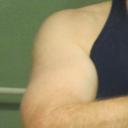Yahoo Answers is shutting down on May 4th, 2021 (Eastern Time) and beginning April 20th, 2021 (Eastern Time) the Yahoo Answers website will be in read-only mode. There will be no changes to other Yahoo properties or services, or your Yahoo account. You can find more information about the Yahoo Answers shutdown and how to download your data on this help page.
Trending News
Just how accurate are calipers for measuring body fat %?
I looking for something like +/- 2%.
3 Answers
- ClickMasterLv 710 years agoFavorite Answer
Not very. All measurements of body fat are based on norms. There is no way to measure body fat in a person quantitatively. The best methods, however, are X-ray absorption followed by wet/dry weighing. Calipers are the poor man's method and few people really get good results with them because of the problem of how to pinch, where to pinch, how hard/soft to pinch, generally how to manipulate the calipers and take the readings, Hawthorn performance effect, etc. Nonetheless, you can get an approximation that is better than nothing and certainly better than impedance scales which are just a gimmick to sell scales.
I guess it goes without saying that the best results will be obtained if multiple measurements are made which the measurer believes to be well accomplished and then averaged to reduce the significance of individual measurement anomalies.
If you're going to use calipers and you practice using them until you can do make the measurement precisely as described with the instructions, you can get good results from a 7 point system. You'll lose some accuracy if you use a 3 point system.
I use calipers and my best guess is about 15% bf. However, to ensure that's a reasonable answer, I compared my weight now with my weight when I had my leanest adult body which happens to have been when I was in military boot camp many years ago. I have added quite a bit of muscle and also a significant amount of fat, but when I did my best estimates or those deviations and did the math, the results suggested about 15% that way as well. So, at least I had a cross check method.
To answer your question about accuracy, there is no way to create a specification which will apply to all because we all vary in thickness of skin and body composition deviation from the norms on which the measurement analysis is based. However, if you want a best guess, I would say your +/-2% would be realistic if you have a relatively normal body composition and fat distribution and do everything right. I doubt anyone will get better that 4% deviation with other than dumb luck and most people are probably off by as much as 5-10% or more.
Notwithstanding the above, I really don't know why anyone would care what their percent bf is unless they have some requirement to meet for something like employment with a Fire Department. Our ideal weight is a very personal thing and we all draw that line somewhat differently.
Good luck and good health!!
♠
Source(s): Used to design industrial electronic measuring instruments including scales. - ElizabethHLv 710 years ago
I don't know of any studies comparing hand held, digital, body immersion, or the scales which give a readout. The one below looks accurate. Maybe, if it works like the old ones, the person has measured maybe seven areas, and they are averaged. For example, if just the fattiest part is measured, it might give a different reading than if the wrist is measured. This is where the water immersion method comes out way ahead of the others. Fat floats.




